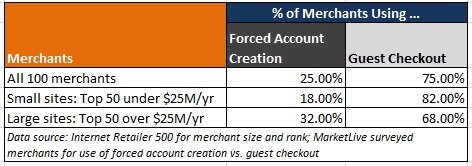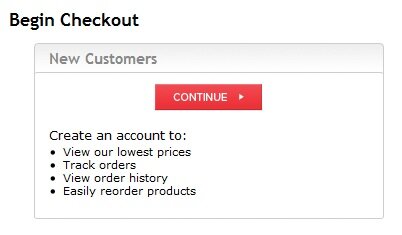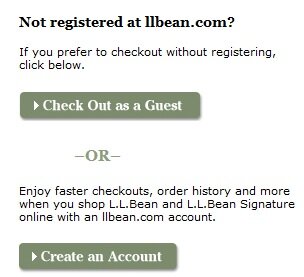Forced account creation: a trend to ignore (for most)
October 10, 2011 Leave a Comment
More and more merchants are employing forced account registration – that is, forcing account creation before shoppers complete their first online purchase. Merchants force account creation in the belief that they can capture more shopper data that way – especially an email address – even if a purchase is ultimately abandoned. But for most merchants, the opposite may, in fact, be true.
The trend is certainly real. We surveyed 100 retailers from the Internet Retailer 500 – the 50 top-ranked merchants earning more than $25 million in annual online revenue, and the 50 top-ranked merchants with online sales under $25 million – and discovered that overall, 1 in 4 of these merchants use forced account creation.

But there’s a marked discrepancy between large and small sites, with the big players using forced account creation almost a third of the time – 77% more often than the specialty and niche merchants. After all, larger brands not only attract larger audiences, but they can offer deeper discounts due to economies of scale – giving shoppers a powerful price incentive to endure the account creation process.
We also noticed similarities in the type of products and services on offer among merchants deploying forced registration. Broadly, they fit into one of the following classifications:
- They’re large, multi-category merchants. As stated above, mega-players like Amazon.com, Overstock.com and Drugstore.com have the clout to force account creation – they offer consumers the convenience of one-stop shopping and the lure of wide discounts as payoff for setting up an account.
- They offer goods and services consumers replenish more than once a month. For constant users of grocery or diet meal delivery and movie rental services, account registration can actually be a time-saver – they need only enter payment and shipping information once.
- They offer B2B goods and services. For merchants selling to other companies with the need to place recurring or standing orders, forced account registration can similarly be a convenience rather than a hassle – allowing customers to easily access order histories and manage billing.
- They’re membership organizations with incentives to join. From Costco, which offers members steep discounts for buying in bulk, to the Gilt Groupe, whose members receive exclusive promotions on sought-after luxury goods and local services, registration is tied to receiving significant benefits unavailable to the general public.
-
They message incentives for account registration clearly. Regardless of the business type, merchants successfully employing forced
 registration spell out the reasons shoppers should sign up. At right, IDWholesaler calls attention to the convenience factor for its B2B audience, citing easy order tracking and reorder options as well as price discounts.
registration spell out the reasons shoppers should sign up. At right, IDWholesaler calls attention to the convenience factor for its B2B audience, citing easy order tracking and reorder options as well as price discounts.
If your business doesn’t fit into one of the above categories, we still recommend giving shoppers the option to check out as a guest – the risk is too high that forcing account creation will alienate potential customers. Forced account registration is a significant cause of purchase abandonment, contributing to 14% of incomplete purchases, according to industry researcher Forrester.
A large usability study recently reported in Smashing Magazine found that forced account creation was an even bigger barrier to purchase: one in three shoppers abandoned purchases when forced to register, the study found. Test subjects gave two primary reasons for their reluctance:
- Inconvenience. Consumers already juggling multiple logins at home and work are unlikely to create another username and password if the product can be found elsewhere without registering.
- Mistrust.Registration degrades customer trust – broadcasting the intent to store shopper’s personally identifiable information, while creating the expectation of future marketing harassment. The researcher reported, “40% of test subjects expected to be spammed with marketing material, even if they explicitly declined to sign up for a newsletter during the checkout process. … ‘If I create an account, they can send me spam from now on and forever.’”
Since guest checkout is such a boon to shoppers, merchants should not only offer it, but they should call attention to it at the beginning of the checkout – as 1-800-Flowers does, letting shoppers know they can set up an account later if they so choose. Those opting to sign in can use their Facebook login, boosting the convenience factor of account creation.

L.L. Bean similarly offers guest registration while enumerating the benefits of account creation – putting an emphasis on convenience with the promise of “faster checkouts, order history and more.”

Collect email addresses in the very first checkout step; if shoppers abandon purchases later, merchants can still contact them for follow-up, even without forced account creation. To build trust, clearly state the reason for collecting that email address — to communicate about the shopper’s order — as Barnes & Noble does below. Make signing up for additional updates and offers an optional extra.

Connect with us: